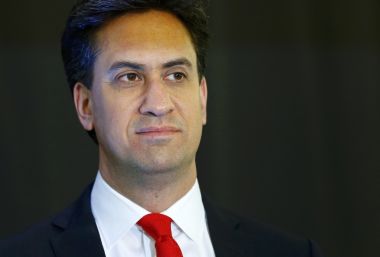Miliband is 'deeply sorry' for scale of Labour defeat
Labour leader Ed Miliband has said that his party had suffered a "very disappointing" night.

"This has clearly been a very disappointing and difficult night for the Labour Party," he told supporters after retaining his own parliamentary seat in Doncaster, northern England.
Effectively conceding defeat, Miliband added that he was "deeply sorry" for what had happened elsewhere in Britain, especially in Scotland where he said a surge of nationalism had overwhelmed the Labour party.
The Chancellor of the Exchequer, George Osborne, said that the next government faced a major task bringing the country together, after an election in which nationalists won 56 of the 59 seats in Scotland. "To bring the United Kingdom together ... is going to be one of the big tasks we now face," Osborne said in a victory speech after being re-elected for Tatton in northwest England.
Prime Minister David Cameron said earlier today that he wanted to implement plans for further devolution of political powers to Scotland and Wales as fast as possible.
The SNP avalanche swept away Douglas Alexander, Labour's shadow foreign secretary, who had been in charge of Ed Miliband's general election campaign. He was defeated by Mhairi Black, a 20-year-old politics student who is now the youngest MP elected since 1667.
Alexander admitted Scotland's voters had lost trust in the Labour party, saying: "This has been a very difficult night for Labour."
British stocks opened sharply higher and sterling surged on Friday as early British election results showed the Conservatives poised to return to power without the need of a formal coalition. With Cameron's Tories generally perceived to be more market-friendly than the opposition Labour Party, the FTSE 100 was poised to re-test its recent highs. Sterling was on course for its biggest daily rise against the euro and dollar since 2009.
"The odds were stacked against such a decisive outcome. This result is far less complicated than the markets' worst fears," said Bill O'Neill, Head of the UK Investment Office at UBS Wealth Management.
But while the short-term political risks may have diminished, the longer-term risk of Britain holding a referendum to leave the European Union remains, particularly for sterling.
"We have some of the near-term political risks being removed but there are a couple of factors that are going to work against sterling for the longer term," said Ian Stannard, senior currency strategist at Morgan Stanley in London.
"The risks of an EU referendum will come into focus and fiscal austerity under the Conservatives may also mean that the Bank of England keeps interest rates lower for longer."
Sterling jumped more than one per cent against the dollar to trade above $1.55 for the first time since late February, and rallied two per cent against the euro to 72.4 pence per euro.











